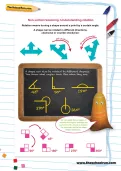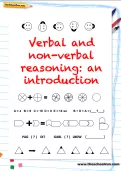Important update from TheSchoolRun
For the past 13 years, TheSchoolRun has been run by a small team of mums working from home, dedicated to providing quality educational resources to primary school parents. Unfortunately, rising supplier costs and falling revenue have made it impossible for us to continue operating, and we’ve had to make the difficult decision to close. The good news: We’ve arranged for another educational provider to take over many of our resources. These will be hosted on a new portal, where the content will be updated and expanded to support your child’s learning.
What this means for subscribers:
- Your subscription is still active, and for now, you can keep using the website as normal — just log in with your usual details to access all our articles and resources*.
- In a few months, all resources will move to the new portal. You’ll continue to have access there until your subscription ends. We’ll send you full details nearer the time.
- As a thank you for your support, we’ll also be sending you 16 primary school eBooks (worth £108.84) to download and keep.
A few changes to be aware of:
- The Learning Journey weekly email has ended, but your child’s plan will still be updated on your dashboard each Monday. Just log in to see the recommended worksheets.
- The 11+ weekly emails have now ended. We sent you all the remaining emails in the series at the end of March — please check your inbox (and spam folder) if you haven’t seen them. You can also follow the full programme here: 11+ Learning Journey.
If you have any questions, please contact us at enquiries@theschoolrun.com. Thank you for being part of our journey it’s been a privilege to support your family’s learning.
*If you need to reset your password, it will still work as usual. Please check your spam folder if the reset email doesn’t appear in your inbox.
How to structure 11+ preparation and avoid stress

If you’re reading this, it’s probably because you have a child at primary school, an ideal (but competitive) secondary school in your mind, and only a vague idea about the route from one to the other.
Read on for some ideas to help you structure your child’s exam preparation. A clear sense of what needs to be worked on at each stage is usually the best way to avoid unnecessary stress. Most of the suggestions are not specific to the 11+, but will help your child to succeed in their studies and enjoy their work, whether or not they end up taking a competitive entrance exam.


Prepare For The 11+ Exam
- Essential English and maths skills
- Verbal and non-verbal reasoning questions
- Reading comprehension & CLOZE tests
11+ preparation strategy 1: Start early… but don’t mention the 11+
It is vital to avoid dangling the prospect of the 11+ as a motivation or a menace for your child. As far as possible, take it as an incentive for yourself, spurring you to help them achieve their best!
The core of 11+ preparation has very little to do with the exams themselves. Comprehension tricks and maths test shortcuts are no more than useful extras – the brandy on the Christmas pudding. An in-depth knowledge of past papers is useful, but not fundamental.
Instead, by far the most important skills are central to the primary school curriculum:
- Are your child’s times tables reliable and fast – and can they use them flexibly to solve problems?
- Can they perform all four operations (addition, subtraction, multiplication, division) confidently, including with decimals?
- Are they comfortable with numbers expressed as fractions, decimals, ratios and percentages?
- Do they have a good phonetic understanding, which enables them to spell logically – even if not always correctly?
- Can they write short stories with mostly accurate punctuation and simple but thoughtful descriptions?
- Can they talk to you about the books they are reading, answering questions about characters and situations?
A child who can do these things well in Year 4 will be ready to start 11+ preparation confidently in Year 5. On the other hand, if you begin to look at exam materials without this core knowledge in place, the work is likely to be frustrating and ineffective.
To be really strong in these areas, children usually need some help from their parents. However, you shouldn’t present these things as though they are the first stage of exam training... even if, in your mind, they are! These skills are crucial to any young person’s academic progress – valuable in their own right – and helping with them can be an enjoyable way for you to become involved in your child’s development. Children associating academic work too closely with exams is very counter-productive. It creates the belief that the only reason to learn is to be marked for it; and, further down the line, that to fail an exam is to waste years of preparation.
11+ preparation strategy 2: Practise skills, not just exams
From the start of Year 5, more or less, your child will be ready to start thinking about exam preparation, and this will involve looking at past papers and other practice materials.
However, don’t fall into the trap of chewing through 11+ past papers at a tremendous rate. This way, your child will only reinforce their errors. Instead, use papers as a source of interesting questions. Go back over old work, learning the lessons from mistakes and repeating difficult questions. Encourage your child to put themselves in the place of the examiner. What is the intention behind each question? What skills are being tested, and how can they demonstrate them?
Save timed practice until later!
11+ preparation strategy 3: Set medium-term goals
Two common 11+ preparation mistakes are to set very short-term goals on the one hand, and on the other to motivate your child’s work by referring frequently to the exams.
Short-term goals can be frustrating, because children’s performance inevitably fluctuates over time.
Long-term exam goals are problematic for several reasons. The simplest of these is that children see time in shorter windows than adults, and an objective several months away can seem meaningless. Instead, set medium-term goals, and keep them achievable.
11+ preparation strategy 4: When to time – and when not to time
Don’t mix up skills learning and timed practice! Timed work tends to involve reinforcing mistakes as much as it does skills. What’s more, difficulties with exam timing almost always come about because core knowledge is weak, leading to slow work in some sections of an exam.
Instead always work slowly and thoughtfully, without pressure, and repeating questions as necessary, until the last couple of months before the 11+. At this stage, it is important to introduce time limits – but very relaxed ones at first. Build up step-by-step to completing a practice paper according to the exam’s actual timing.
Robert Lomax is a teacher and educational author. He writes the popular RSL Educational school admissions blog and the 11 Plus Lifeline home tutoring programme. TheSchoolRun users can claim a 20% discount on 11 Plus Lifeline packages by quoting TSR.







